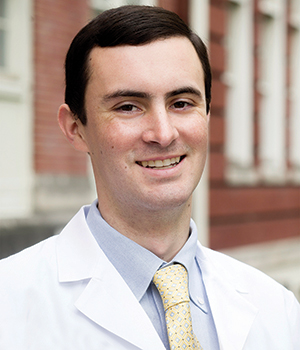 Darryl Outlaw
Darryl Outlaw
Fourth-year medical student Darryl Outlaw hasn’t always envisioned a career in medicine. The Birmingham native followed his passion for math and science as a chemical engineering major at the University of Alabama until a deeply personal experience during his junior year changed everything.
“My mother and grandfather were both diagnosed with cancer that same year,” says Outlaw. “I was able to see firsthand the skill, compassion, and dedication of both the oncologists and the health care professionals who treated my mother and grandfather, and the true potential of medicine to make a difference in the lives of others. This experience inspired me to pursue a career in medicine because I knew it would be the most meaningful way that I could serve other people.”
Shortly after acceptance to the UAB School of Medicine, Outlaw was notified that he was the recipient of one of the scholarships from the Paul W. Burleson Scholarship Foundation, established by Dr. Paul W. Burleson prior to his death. Dr. Burleson began his medical education in 1938 at the Medical College of Alabama, now the UAB School of Medicine, later graduating from George Washington University in 1942. He received advanced training at the University of Pennsylvania Graduate School of Medicine and after returning to Birmingham, he established a practice in internal medicine that would span four decades. Beginning in 1951, he served on the UAB School of Medicine faculty for 35 years as an internal medicine specialist until his retirement in 1986.
Burleson’s gifts are in response to a concern that continued to trouble him after his retirement—the fact that bright young students from Alabama were being siphoned away by prominent medical schools in other states. That reality, along with his personal knowledge of the hardships the financial burden of medical school creates for students, prompted Dr. Burleson and his wife Martha R. Burleson to make outright and testamentary gifts for endowed and sponsored medical scholarships along with an endowed chair in internal medicine to the School of Medicine through the foundation bearing his name. Today, more than $1.7 million has been received from Dr. Burleson and the Foundation for these designations.
Since academic year 2007-2008, a total of 34 medical student Burleson Scholars have received more than $1.46 million in sponsored scholarship dollars to help them defray the costs of medical school. Burleson Scholars must demonstrate high scholastic achievement and have financial need. They also must remain in the top third percentile of their medical class.
Today, Ms. Linda Draughn, Dr. Burleson’s step-daughter, manages the Burleson Foundation and she remains committed to honoring Dr. Burleson’s desire to keep talented medical student leaders in Alabama while helping them pursue their career goals. “The opportunity to make a difference in the lives of students is immeasurable and, hopefully, the gift that keeps on giving,” says Ms. Draughn.
“One of Dr. Burleson’s goals in establishing the scholarship endowment was to encourage students in the state of Alabama to enter the field of medicine,” says Outlaw. “It’s rewarding that I can help fulfill a part of his original vision.”
Outlaw explains that receiving a scholarship to help offset the cost of medical education offered him the freedom to pursue his greatest interests when selecting a specialty for his upcoming residency training. “Without a scholarship, you do have to consider how to pay back the loans from medical school,” he says. “Receiving this generous scholarship removed this consideration for me so that I could focus on my true passions when planning for residency training.”
Outlaw seeks to match in internal medicine residency and later specialize in oncology and hematology—choices that can be traced back to his family’s experience with cancer. “When my medical training is complete, I hope to practice medicine in an academic setting that will allow me to teach, participate in research, and care for patients,” he says.
He adds that while the scholarship alleviated a significant financial burden associated with the high cost of medical education, the award carries meaning that extends beyond its financial benefits. “The scholarship demonstrates Dr. Burleson’s investment in UAB’s next generation of medical leaders, which is such an encouragement to medical students and residents.”
Outlaw recalls speaking at the annual Scholarship Dinner during his first year of medical school. “It was overwhelming to see the number of donors in attendance that night and realize their commitment to UAB,” he says. “It’s inspiring to know that there are so many alumni dedicated to the success of the next generation of physicians. They are truly paying it forward to help others achieve their goals.”